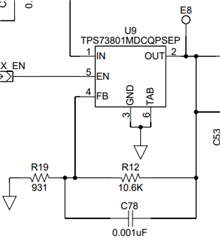Tool/software:
Good Morning,
I had a similar question regarding a capacitance change to a circuit using the TPS73801MDCQPSEP. A schematic snippet is shown below for reference:

The 0.001uF capacitor causes a large spike to occur on power-up. With no means to control the power-up ramp rate, I'd like to understand how changing this to a 0.1uF capacitor would change the behavior? Lets assume a 16V load with 100mA max draw. Is there any risk of damage to either the circuit or the load under these conditions? Let me know if you need any more information.
Respectfully,
-Kevin


